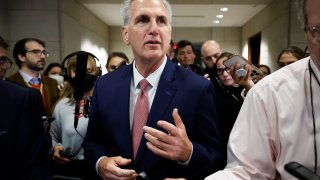
- Republican House Minority Leader Kevin McCarthy won the support of a majority of his own caucus in an election to choose the party's nominee for speaker of the House.
- The results of the secret ballot vote were 188 votes for McCarthy and 31 for his challenger, Rep. Andy Biggs.
- McCarthy still needs to win 218 votes in the full House to become speaker. Typically, the majority party's nominee wins the vote, but if McCarthy's opponents back someone else or don't vote at all, he could come up short.
WASHINGTON — Republican House Minority Leader Kevin McCarthy, of California, won the support of a majority of his own caucus Tuesday in an internal party election to choose its nominee for speaker of the U.S. House of Representatives.
Watch NBC6 free wherever you are
>The results of the secret ballot vote were 188 votes for McCarthy and 31 for Rep. Andy Biggs, of Arizona, a member of the conservative House Freedom Caucus who challenged McCarthy from the right.
McCarthy will now need to win at least 218 votes in the full House of Representatives in a January vote in order to formally become speaker of the House in the new Congress.
Get local news you need to know to start your day with NBC 6's News Headlines newsletter.
>In addition to electing McCarthy, the Republican caucus voted by voice to keep Rep. Steve Scalise, of Louisiana, in his post as No. 2, which would make him House majority leader in the event Republicans take control. Scalise ran unopposed, so there was no need for a formal ballot vote.
The third-ranking position, Republican conference chair, will go to Rep. Elise Stefanik, of New York, a close ally of former President Donald Trump. Stefanik won a relatively close election for the position, with 144 votes, to 74 votes for her opponent, freshman Rep. Byron Daniels, of Florida.
Typically, the chosen nominee of the party that holds the majority would win the full House vote for speaker, but it's not guaranteed. If McCarthy's Republican opponents band together and don't vote at all, then he could come up short of 218.
Money Report
Republicans have yet to officially win enough races in the midterm elections to clinch the majority in the House, but on Tuesday morning it was difficult to see how Democrats could prevail in the districts where vote counting is still ongoing.
McCarthy has been preparing to assume the speaker's gavel since shortly after Election Day, when he announced "transition teams" made up of his allies to smooth the GOP takeover of the House majority.
McCarthy is well-liked within his caucus, and he has aligned himself with Trump, earning him credit with some on the far right of the GOP.
Rep. Marjorie Taylor Greene, R-Ga., endorsed McCarthy's bid for speaker on Monday, telling former Trump advisor Steve Bannon that not endorsing him could fracture the party.
"It's very, very risky right now to produce a leadership challenge, especially for speaker of the House, when [Democrats] are going to open the door and allow Liz Cheney possibly to become speaker," she said on Bannon's streaming TV show, War Room.
Under House rules, anyone can be elected speaker, even if he or she is not a member of the House. Rep. Liz Cheney, of Wyoming, lost her Republican primary earlier this year, a loss caused in part by her very public break with Trump, who won Wyoming by 43 points in the 2020 presidential election.
McCarthy's challenger, Biggs, said in a statement Monday that the leader "does not have the votes needed to become the next Speaker of the House and his speakership should not be a foregone conclusion."
Biggs cited the GOP's disappointing results in the midterm elections, after they had been widely expected to win the majority by at least 20 seats. On Tuesday, NBC News was projecting that Republicans would win the House by only two, with a three-seat margin of error.
"The promised red wave turned into a loss of the United States Senate, a razor-thin majority in the House of Representatives, and upset losses of premiere political candidates," Biggs said in the statement. "My bid to run for Speaker is about changing the paradigm and the status quo."
Correction: This story has been updated to reflect that Rep. Marjorie Taylor Greene, R-Ga., endorsed McCarthy's bid for speaker.






